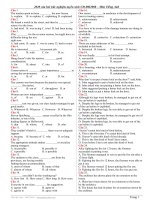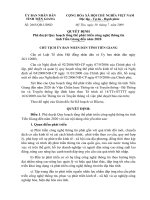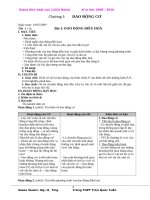2020
Bạn đang xem bản rút gọn của tài liệu. Xem và tải ngay bản đầy đủ của tài liệu tại đây (170.9 KB, 3 trang )
<span class='text_page_counter'>(1)</span><div class='page_container' data-page=1>
<b>UNIT 9: NATURAL DISASTERS</b>
<b>Exercise 1: Read and put the headings into the correct paragraphs.</b>
<b>Human and animal death</b> <b>Floods</b>
<b>Tsunami</b> <b>Landslides and avalanches</b>
<b>Fires</b>
Earthquakes can cause many other natural disasters once they strike, here are
their names and a brief description of each:
1. ... – Are giant sea waves that are produced by
the sudden violent movement of the earths plates of volcanoes under the
water The time periods of these waves can last up to an hour, causing
massive devastation as seen in Sri Lanka in 2004.
2. ... – Fires can be caused when earthquakes
damage electrical power stations or gas lines. These fires can be impossible
to stop sometimes. In 1906 in San Francisco, fire caused by an earthquake
killed more people than the earthquake itself.
3. ... – Earthquakes can produce unstable slopes
which can lead to the moving of the ground, which is called a landslide.
Landslides can cause severe damage after an earthquake occurs, for example
it can crash down homes, cars of even people.
4. ... – A flood is an overflow of water that
reaches land. This occurs when a lake, dam or river overflows due to the
movement of land due to an earthquake or landslide. Floods can have
devastating effects on terrain, animal life and human life.
5. ... – Of course, earthquake can cause severe
injury and loss of life for both humans and animals. Properties can also
suffer, and the collapse of buildings are expected when highly measured
earthquakes occur. The aftermath of an earthquake can cause disease and
lack of basic necessities for people.
<b>Exercise 2: Read the text and decide T (true)/ F (false) for each statement.</b>
<b>Natural disasters</b>
</div>
<span class='text_page_counter'>(2)</span><div class='page_container' data-page=2>
measured in lives lost, economic loss, and the ability of the population to
rebuild. Events that occur in unpopulated areas are not considered disasters. So
a flood on an uninhabited island would not count as a disaster, but a flood in a
populated area is called a natural disaster.
All natural disasters cause loss in some way. Depending on the severity, lives
can be lost in any number of disasters. Falling buildings or trees, freezing to
death, being washed away, or heat stroke are just some of the deadly effects.
Some disasters cause more loss of life than others, and population density
affects the death count as well.
Scientists, geologists, and storm watchers work hard to predict major disasters
and avert as much damage as possible. With all the technology available, it’s
become easier to predict major storms, blizzards, cyclones, and other weather
related natural disasters. But there are still natural disasters that come up rather
unexpectedly, such as earthquakes, wildfires, landslides, or even volcanic
eruptions. Sometimes, a time of warning is there, but it’s often very short with
catastrophic results. Areas that are not used to disasters affected by flash floods
or sudden hail storms can be affected in an extreme way.
<b>No.</b> <b>Statements</b> <b>T/</b>
<b>F</b>
1. Natural disaster is any catastrophic event that is caused by
nature or the natural processes of the earth.
2. A flood on an uninhabited island is counted as a disaster
3. Population density area never faces disasters.
4. Scientists, geologists, and storm watchers can prevent
disasters completely.
5. Areas that are not used to disasters may be affected in an
extreme way when disasters come unexpectedly.
</div>
<span class='text_page_counter'>(3)</span><div class='page_container' data-page=3>
1. What is this natural disaster?
...
2. Where is the scene?
...
3. Does it often rain in this field?
...
4. Can the rice grow well without water?
...
5. What do you see in the scene?
...
6. What are the effects of drought?
</div>
<!--links-->









